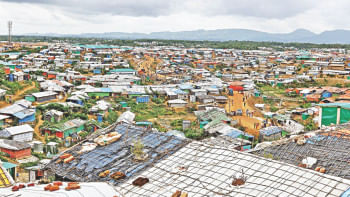Return still elusive

The repatriation of the Rohingyas remains elusive even nine months after the signing of an agreement between Bangladesh and Myanmar.
The deal signed between Dhaka and Naypyidaw in November announced that their going home must begin in January 2018, within two months of the agreement signing.
But not a single Rohingya has been repatriated. Moreover, around 12,000 Rohingyas entered Bangladesh only this year and joined those who took refuge in Cox's Bazar camps last year.
Nobody in Bangladesh can say when the repatriation would begin or how long it would take to complete. Everything now depends on Myanmar's will.
The pressure was on Myanmar after the crisis gripped the world's attention. Myanmar's treatment of the Rohingyas was termed by UN as a "textbook example" of ethnic cleansing.
Aung Sun Suu Kyi and her government faced strong global condemnation and outrage for the scorched-earth campaign carried out by Myanmar's military to drive the Rohingya population out of their homes in Rakhine. The demand for taking punitive action against Myanmar was loud.
Amidst such a situation, Myanmar signed the deal and agreed to begin the process for taking the Rohingyas back to their homes.
But Myanmar was never short of tricks. It imposed some stringent conditions in the deal -- the returnees must show national registration cards or documents of residency. Many Rohingyas have no documentation at all. It was impossible for many of them to present documents as they had to hastily flee killings and torching of homes.
So, the chance of their return remains bleak.
Bangladesh Foreign Minister AH Mahmood Ali had rejected the deal on October 9 in a briefing for diplomats. He said the "criteria are not realistic". But only six weeks later, the government agreed to the deal. There was no deadline for the repatriation; it could go on forever.
Myanmar's ally China had opposed repeatedly any action of the world body at the UN Security Council. Signing the agreement made China's efforts successful, as it pursued bilateral means to resolve the crisis. The deal also made it easy for Myanmar to buy more time and ease international pressure on it.
Myanmar's trick worked well. Everything appears calm right now.
Now, the outcries for the Rohingyas or condemnation for Myanmar from global leaders are not that loud. The world has sort of forgotten the Rohingyas, leaving them to pass days in muddy refugee camps.
Some international media now just run reports reminding the world leaders that this August marks a full year of the Rohingya influx, one of the 21st century's worst refugee crises.
But this would neither reduce the stateless people's agony nor lessen the burden on Bangladesh. The flow of humanitarian aid from international communities has also decreased. Fund shortage may put the host country in a difficult situation in the coming months.
In its latest trick, Myanmar, during Bangladesh foreign minister's visit to Naypyidaw on August 10, asked the words "forcibly displaced myanmar nationals" be replaced with "displaced persons from Rakhine State" on identity cards issued to the Rohingyas in Cox's Bazar.
If this happens, Rohingyas would have to return to their homeland without any identity and they would continue to be considered stateless.
So why did Myanmar resort to such means? It is clear: because Myanmar does not want to take back the Rohingyas. It would be clearer if we see its arrangements for the returning Rohingyas.
Myanmar is building camps to house repatriated Rohingyas as their homes have been burnt during the military crackdown on them last year.
The camps are like prisons. In the camps of Sittwe, the capital of Rakhine, one lakh Rohingyas have been languishing for almost six years. They suffer from chronic malnutrition and receive minimal medical care. They are not allowed to return home. They were forced to leave their homes following sectarian violence in June, 2012.
The returning Rohingyas would be put into such camps and be guarded by the security forces that brutally murdered, raped and tortured many of them. Can anyone imagine it as a safe place for the repatriated Rohingyas? If this is where the Rohingyas are supposed to go, then why would the refugees want to leave the camps in Cox's Bazar?
Would these people, if the repatriation begins at all, be able to return to their homes?
In February, Human Rights Watch report showed that the burnt Rohingya villages have been flattened with bulldozers. There was no sign that any human habitation ever existed there.
Richard Weir, a Myanmar expert with the HRW, said, "There's no more landmark, there's no tree, there's no vegetation. Everything is wiped away."
In March, Amnesty International exposed other developments. Rakhine State was being militarised at an alarming pace. The authorities were building security force bases and bulldozing land where Rohingya villages were burnt just months ago, said an AI report.
The AI said it was difficult to see how the refugees would be able to return to their original places, let alone do so voluntarily, safely and with dignity.
All these lead to the conclusion: Myanmar military needs the land of the Rohingyas, not the Rohingyas.
The commander-in-chief of the Myanmar army Senior General Min Aung Hlaing had also made his intention clear only a couple of days after his troops launched the crackdown on the minority people on August 25 last year.
He described the crackdown as "unfinished business" dating back to the World War II.
Since the mass exodus of the Rohingyas began last year, everyone -- UN and international rights bodies -- has been advocating safe, dignified and voluntary repatriation. But nothing is working for the Rohingyas.
This is not the first time the junta launched a crackdown on the Rohingyas. Bangladesh had to bear the brunt of major influx of the Rohingyas in 1970s and 1990s due to their atrocities against Rohingyas. Following hectic negotiations, Rohingyas were repatriated. But they were not provided safety, security and dignity, resulting in the returns of many of them to Bangladesh.
This time, the negotiations are not working.
Every day the situation is getting worse, diminishing Rohingyas' hopes of going back. And the longer they stay in Cox's Bazar, the heavier becomes the burden on Bangladesh.

 For all latest news, follow The Daily Star's Google News channel.
For all latest news, follow The Daily Star's Google News channel. 









Comments